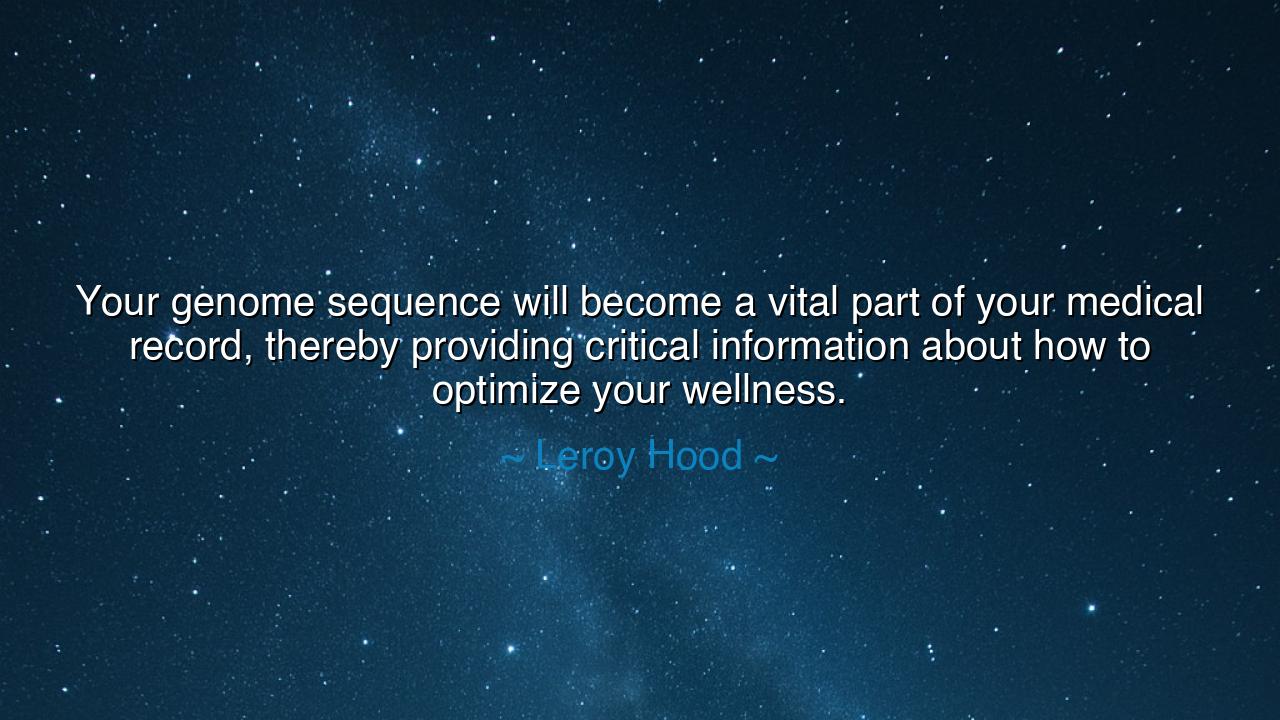
Your genome sequence will become a vital part of your medical
Your genome sequence will become a vital part of your medical record, thereby providing critical information about how to optimize your wellness.






In the visionary words of Leroy Hood, “Your genome sequence will become a vital part of your medical record, thereby providing critical information about how to optimize your wellness,” we hear a profound insight into the future of healthcare. Hood speaks not only of technological progress, but of a revolution in our understanding of the human body and its potential. His statement suggests that genetics, once seen as a mysterious force, will soon be the key to understanding, predicting, and even optimizing human wellness. The genome, the very blueprint of life itself, will no longer be a distant concept, but a central tool in managing health, preventing disease, and improving quality of life.
The origin of this quote lies in Hood’s pioneering work in genomics. As a biologist, he was one of the architects of the Human Genome Project, the monumental endeavor that mapped the entire sequence of human DNA. What Hood foresees is the next evolution of this project: a world where the detailed map of your individual genome will not only explain your genetic predispositions but will also be used as a personalized guide to health. In this future, our genome sequence will be a crucial part of our medical records, allowing for treatments and wellness plans that are tailored to the unique needs of our DNA. It is a future where medicine becomes personal, and where health care is no longer a one-size-fits-all approach but a highly individualized science.
In the same way that the ancients believed the body to be a sacred vessel, so too does Hood suggest that understanding the body’s deepest blueprint will allow us to respect and optimize our health in ways never before possible. The Greeks, led by the insights of Hippocrates, saw medicine as a study not just of the body’s ailments, but of its balance—the humors and rhythms that govern health. By understanding the body’s constitution, they believed one could achieve harmony and wellness. Hood’s words point toward a future where the balance of our body is not only a matter of observation but of deep, scientific understanding, allowing us to personalize our care and truly optimize our wellness at every level.
Consider the story of William Harvey, the 17th-century physician who discovered the circulation of blood. Before Harvey’s work, the human body was a mystery; doctors could only guess at the workings of the heart and blood vessels. But Harvey, through careful study and experimentation, unlocked the secrets of the circulatory system, forever changing medicine. In much the same way, genomics offers us the potential to unlock the mysteries of the human body—not in the abstract, but through a personal lens. As Harvey’s discovery revolutionized our understanding of human physiology, Hood’s work promises to revolutionize our understanding of health itself, providing us with the tools to live longer, healthier, and more fulfilled lives.
However, Hood’s vision is not without its challenges. While genetic knowledge offers tremendous potential, it also carries with it the responsibility of how we use it. The ancients warned of the dangers of hubris, of the human desire to control what should remain mysterious. Just as Prometheus was punished for stealing fire from the gods, so too must we approach the power of genomics with humility. The genome is a treasure, but it is also a reminder of our limits. Knowing our genetic predispositions may help us prevent disease, but it does not make us gods; it makes us stewards of the body’s deep knowledge, entrusted with the sacred task of using it for the betterment of all.
From Hood’s statement arises a critical lesson for future generations: knowledge is power, but with power comes the need for wisdom. As we enter an age where our DNA will be as easily accessible as our medical history, we must ensure that this knowledge is used to serve wellness, not fear. We must commit to using our genome not just to treat disease but to improve life, to honor the body’s complexity, and to guide us toward lives of balance and harmony. Just as the ancient healers sought to understand the body’s humors, so too must we strive to understand the complexity of our genetic makeup and its interplay with our environment.
Therefore, let us embrace the future of genomic medicine, but let us also move forward with respect for the complexity of life. Let us not seek to control or perfect our bodies, but to understand and care for them. Let our genomes not be mere data points, but the blueprints of a life well-lived. In this way, as Hood suggests, we can truly optimize wellness, making the most of the bodies we have, for the benefit of ourselves and the future of humanity. In understanding our genes, we find not just health, but wisdom—the wisdom of knowing who we are, where we come from, and how we can live with greater balance, harmony, and purpose.






AAdministratorAdministrator
Welcome, honored guests. Please leave a comment, we will respond soon